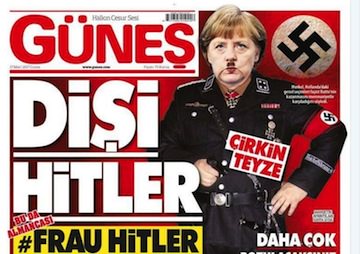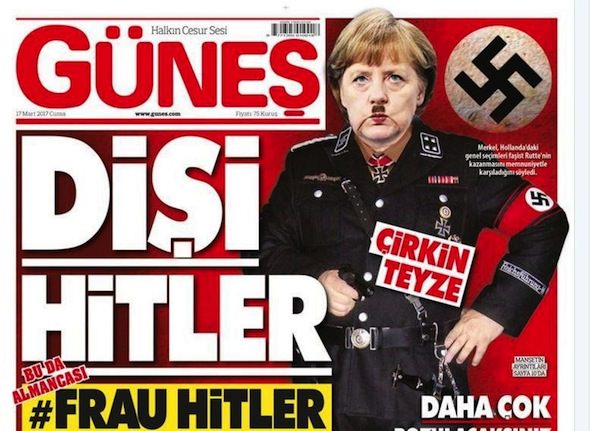Erdogan Hurls ‘Nazi’ Epithets as He Campaigns to Bolster His Power
Turkey's president rips Germany and the Netherlands for blocking rallies among Turkish expats. Those rallies would support a referendum that could vastly increase Erdogan’s authority.

A pro-Turkish government tabloid depicts German Chancellor Angela Merkel as Hitler. (Screen shot via The Independent)
Turkish President Recep Tayyip Erdogan wants more power, and he’s not afraid of making enemies to get it.
Last week, he accused Germany of “fascist actions” and called the Netherlands “Nazi remnants” after those countries barred Turkish officials from campaigning among expatriates in support of a referendum on constitutional changes that would transform Turkey’s government and vastly increase Erdogan’s authority.
The Independent reports:
As the referendum approaches, Erdogan has been leading an inflammatory, anti-western campaign that saw him pushing a political narrative that depicts Turkey as a great nation that is being undermined by an imperialist Europe.
He attacked German chancellor Angela Merkel again on Sunday [March19], accusing her of using “Nazi measures”, according to Agence France-Presse. In a televised speech, he said: “You are right now employing Nazi measures,” using the informal ‘you’ in Turkish in what has become an intense diplomatic dispute. He previously launched a scathing attack on Germany for stopping rallies in advance of the constitutional referendum, in which he repeatedly referred to Germans as ‘Nazis’.
He erroneously labelled the Dutch as “Nazi remnants” in a desperate bid to appeal to voters in the Turkish diaspora. The Netherlands is home to approximately 397,471 people of Turkish origin, who make up 2.4 per cent of the total population. Most of them hold dual nationality and are therefore eligible to vote in the Turkish referendum.
A ‘yes’ in the referendum would rewrite the constitution and transform Turkey from a parliamentary system to an executive presidency, giving Erdogan unprecedented control to appoint ministers, pick senior judges, and dismiss parliament. …
According to the Associated Press, figures opposing the referendum in Turkey have faced threats, violence, arbitrary detentions, a lack of TV airtime and even sabotage in the campaign.
The AKP [Justice and Development Party] leader’s shift towards an autocratic government has led to accusations of being ‘dictatorial’ by critics.
Erdogan came under fire in January after using Hitler’s government as an example of an effective presidential system. He defended his argument that putting all political power in the hands of the presidency would be a success, by saying “there are already examples in the world […] you can see it when you look at Hitler’s Germany. There are later examples in various other countries.”
Turkish officials later said his words were taken out of context.
According to The Independent, Erodogan’s verbal assault continued Wednesday with a warning: “If Europe continues this way [with its current attitudes toward Turkey], no European in any part of the world can walk safely on the streets.”
Erdogan isn’t the only Turkish official using hostile language. The Independent reports that Numan Kurtulmus, Turkey’s deputy prime minister, said “footsteps of neo-Nazism and extreme racism” are occurring throughout “fascist and cruel” Europe. Turkey also is upset with Greece for a court ruling in that country granting asylum to eight Turkish military officials.
As a result of the row with Europe, Erdogan has said that after the referendum Turkey might review its European ties.
The Independent reports:
Mr Erdogan said Turkey will no longer be threatened by the European Union membership process and added that, from now on, it will not allow any Europeans on Turkish soil to carry out “spying” under various pretexts.
He also said “Turkey could no longer be pressured by considerations such as a $6bn (£4.9bn) deal under which it agreed to stop illegal migrants from crossing into Greece in exchange for financial aid and accelerated EU membership talks.
Erdogan presumes the April referendum will pass and has vowed to reinstate capital punishment afterward. Turkey banned the death penalty in 2004 as part of its bid to join the European Union.
The referendum comes within a year of a major crackdown Erdogan led against critics. CNN reports:
The 18-article constitutional reform package — put forward by Erdogan’s ruling Justice and Development Party (AKP) — would turn Turkey’s parliamentary system into a presidential one, effectively consolidating the power of three legislative bodies into one executive branch with the president as its head.
The reforms would also abolish the role of prime minister while granting authority to the president to issue law, declare states of emergency, dismiss parliament and to appoint ministers, public officials and half of the senior judges. It’s known as the “power bill.”
The bill would also allow Erdogan — who served as prime minister from 2002 to 2014 before becoming president — to extend his term in office until at least 2029. …
Since an attempted coup in July, Erdogan has led an intense crackdown on government critics and those with alleged ties to US-based cleric Fethullah Gulen, whom Turkey blames for the coup attempt.
Hundreds of military officers have been dismissed, roughly 11,000 teachers were suspended and many media organizations were shut down.
Erdogan said recently that 43,000 people have been arrested and 95,000 fired from state posts in relation to the coup attempt.
Since the failed coup, The Guardian found that over 125,000 people have been dismissed or suspended from their jobs and about 40,000 others have been arrested, including 140 writers and journalists who were put behind bars under terrible conditions. Katie Morris, head of Europe and Central Asia for London-based freedom-of-expression advocates Article 19, said: “Prison conditions are dire and no evidence of involvement in the coup has been provided against those held in pre-trial detention, either publicly or in private.” In addition, 130 media outlets have been shut down since July.
Meanwhile, Britain has reportedly ignored the human rights abuses and continues to build relations with Turkey. In January, the U.K. agreed to a $124 million arms deal that will provide fighter jets to Turkey. Since 2015, $375 million in military contracts has been licensed between the two countries, The Guardian reports, and at least 117 British companies have applied for military export licenses to Turkey in the last five years. “It marks the start of a new and deeper trading relationship with Turkey and will potentially secure British and Turkish jobs and prosperity for decades to come,” said U.K. Prime Minister Theresa May.
Independent journalism is under threat and overshadowed by heavily funded mainstream media.
You can help level the playing field. Become a member.
Your tax-deductible contribution keeps us digging beneath the headlines to give you thought-provoking, investigative reporting and analysis that unearths what's really happening- without compromise.
Give today to support our courageous, independent journalists.








You need to be a supporter to comment.
There are currently no responses to this article.
Be the first to respond.